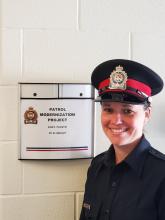David Cefalu

David Cefalu began his law enforcement career with the Wauwatosa Police Department in 2006 as a police officer. He currently serves as a Detective in the Investigative Division. David has served as an officer in the Patrol Division and the Special Operations Group, where he investigated violent crimes and drug trafficking. He has focused on evidence-based policing measures through academic partnerships on projects analyzing, evaluating, and implementing a harm-focused hotspot experiment and processes for recruiting and selecting police officers. David is the department lead Defensive and Arrest Tactics Instructor and a Professional Communications Instructor. He also served 15 years with the department’s Special Response Team.
David is also a Major in the Wisconsin Air National Guard with 23 years of service ranging from Security Forces to Inspector General. He currently serves as a Wing Executive Officer. He holds a Doctorate of Business Administration in Management from the University of Wisconsin-Whitewater. David holds a Masters of Business Administration in Public Administration from Concordia University-Wisconsin and a Bachelors of Criminal Justice from Troy University. His research interests include place-based harm-focused policing, and personnel recruitment, selection, and retention. His dissertation focused on ethics, officer wellness, and the reintegration of military veterans.
Bill Walsh

William D. Walsh retired from public service on January 1, 2026, as a Captain with the Voorhees Township Police Department (NJ). There, he commanded the Operations Division overseeing patrol and investigative functions. Throughout his career, Walsh focused on organizational leadership, sucession planning, officer wellness, and the development of evidence-based programs designed to improve officer well-being and organizational effectiveness.
Walsh’s research and program development contributed to implementing several initiatives. These include a comprehensive health and wellness program incorporating automatic wellness visits with a police psychologist, family engagement components, and the formation of a multi-agency peer support team that has since been replicated across jurisdictions. He has collaborated with multiple universities to develop, evaluate, and enhance training programs and organizational initiatives within policing and public safety.
In 2019, the International Association of Chiefs of Police recognized Walsh with its 40 Under 40 Award for his work in officer health, wellness, and community engagement. He has lectured at numerous universities and professional conferences on wellness and resilience, early intervention systems, field training, performance metrics, and community policing initiatives. He has also been published on early intervention systems and both community and law enforcement mental health programming. Walsh currently serves as a lecturer with the Rutgers University–Newark School of Criminal Justice.
Walsh is a graduate of the Police Executive Research Forum’s Senior Management Institute for Police (SMIP Session #93), a Rutgers University Certified Public Manager, an Executive Fellow and subject matter expert with the National Policing Institute. He has completed his coursework and is currently in the internship fieldwork phase of his master’s degree in Clinical Mental Health Counseling.
David T. Snively

David T. Snively, Ph.D. has served in public safety since 2007, rising from 911 dispatcher to Interim Chief of Police. He has held positions and commanded units in 911 Communications, Patrol, Traffic and DUI Enforcement, Investigations, Recruiting, Accreditation, Public Information, and Training. Dr. Snively now serves as an Assistant Director at the International Association of Chiefs of Police (IACP), where he oversees the Center for Police Research and Policy and supports the Member Engagement Team. This team coordinates the efforts of more than 800 volunteer leaders working in three divisions, 27 committees, and 23 sections, representing the IACP’s nearly 35,000 members in over 170 countries.
Dr. Snively is a graduate of the Northwestern School of Police Staff and Command, PERF’s Senior Management Institute for Police and the Georgia Chief Executive Training course. He is a Master Instructor and holds specialty instructor certifications in Duty to Intervene, Integrated Communications and Tactics (ICAT), Use of Force, Firearms, Taser, and Field Sobriety. He is also a Use of Force Analyst and a Master Public Information Officer.
In addition to his professional experience, Dr. Snively an adjunct instructor of Criminal Justice and Criminology at Georgia State University where his research focuses on police training, education requirements, and policymaking. He was selected as a National Institute of Justice LEADS Scholar in 2021 and a Doctoral Fellow of the Academy of Criminal Justice Sciences in 2021. Dr. Snively remains a sworn reserve officer in metro-Atlanta.
Jason Rash

I would like to connect with one of our closest non-governmental partners, the Alliance For Children, to test and evaluate the impact on intimate partner violence, by beginning a consistent practice of forensically interviewing child witnesses of domestic violence. Our department, in an ongoing partnership with the Alliance For Children and the Tarrant County District Attorney’s Office, has modeled a consistent and successful practice of forensically interviewing child victims of sexual abuse and continuous physical abuse to better aid in the prosecution and conviction of offenders. The expansion of this practice into the realm of domestic violence prosecution when children are witnesses will hopefully also aid in the services offered to families of domestic violence and aid in the prosecution of said offenses. I hope to research historical cases where a child was present, yet not interviewed, and do a direct comparison of conviction rate and time sentenced for those in which a child was forensically interviewed.
James Knoblach

Captain James Knoblach has served with the Suffolk County Police Department since 2010 and currently oversees operations at the 7th Precinct as part of its Command Staff.
He was previously the Commanding Officer of the 2nd Precinct Crime Section, the Police Technology Bureau, and founded the Department’s Behavioral Health Section. His roles have included overseeing investigative, anti-crime/gang, and community support units, as well as working in the Offices of the Police Commissioner and Office of the Chief of Patrol. He also has patrol and specialized unit experience in both the 1st and 3rd Precincts.
Captain Knoblach has spearheaded department-wide initiatives focused on policy, program evaluation, and resource optimization. He has a strong background in leveraging data and technology to drive operational effectiveness across law enforcement functions. He holds a B.B.A. in Finance and an M.B.A. with a concentration in Information Systems Security, both from James Madison University.
Jennifer Hall

Jennifer Hall has served the citizens of Louisville for the past 15 years in multiple roles for the Louisville Metro Police Department. She is currently assigned to the Career Development Unit as well as being the Police Training Officer Coordinator, which is part of the LMPD Training Division. Prior to this assignment, Sergeant Hall was a detective in the Crimes Against Children Unit.
She holds a BS in Criminal Justice from Eastern Kentucky University, a MA in Sociology from the University of Louisville, and a PhD in Applied Sociology from the University of Louisville. Her dissertation was a case study that examined the efficacy of a community policing initiative piloted by LMPD, which focused on the interconnectivity between public perception of law enforcement and the police perception of public opinion. Sergeant Hall has ambitions to pursue research that surrounds police training and curriculum reformation, focusing on new officers and their learning, their ability to communicate effectively, and decision-making skills. With a passion for law enforcement training, Sergeant Hall hopes to have an impact on mindset, officer intervention, and police culture.
Janice Iwama, Ph.D.

Dr. Janice Iwama is an Associate Professor in the Department of Justice, Law & Criminology at American University in Washington, D.C. She received her Ph.D. in Criminology and Justice Policy from Northeastern University. As a recognized expert in the study of violent crime and communities, her research focuses on the intersection between race, ethnicity, immigration, and crime. She has worked extensively on research grants with federal, state, and local law enforcement agencies on gun violence, hate crimes, and policing. Her research has been published in several high-ranking scholarly journals including Criminology & Public Policy, Justice Quarterly, and the Journal of Research in Crime & Delinquency.
Jessica Huff, Ph.D.

Jessica Huff is an Assistant Professor in the School of Criminal Justice at the University of Cincinnati. Her research focuses on policing and program evaluation. She is specifically interested in using experimental methods to examine police programs and policies intended to improve police effectiveness and fairness. She has partnered with police agencies across the U.S. to evaluate programs including violence reduction strategies, intelligence-led approaches to gun crime investigations, use of force training, and body-worn cameras. She has additionally worked with police agencies to assess and enhance their capacity to identify trends in crime and officer performance. Her work has been funded by the Department of Homeland Security, Centers for Disease Control and Prevention, and the Bureau of Justice Assistance. She has published in outlets including Criminology, Criminology & Public Policy, and the Journal of Experimental Criminology. In addition to teaching statistics and policing in an academic setting, she has provided professional training related to crime analysis, crime mapping, and statistics to police practitioners throughout the U.S. and internationally, funded by the United Nations Development Program and the American Society of Evidence-Based Policing.
Scott Mourtgos

Scott M. Mourtgos, Ph.D. is an Assistant Professor of Criminology and Criminal Justice at the University of South Carolina. His applied research program focuses on policing practices, with specific interests in police personnel, interview and interrogation methods, crime deterrence policies, and the use of criminal justice data analysis to evaluate outcomes linked to policy change and operational tactics. Prior to entering academia, he served for 20 years in law enforcement, holding a variety of roles, including that of a police executive. He is a graduate of the FBI National Academy (Session 280) and has received numerous honors, including induction into the Evidence-Based Policing Hall of Fame at George Mason University’s Center for Evidence-Based Crime Policy.
Victor “Tony” Galladora

Lieutenant Victor “Tony” Galladora is a 15 year veteran of the Montgomery County (Maryland) Department of Police and is currently serving as the Executive Officer for the Field Services Bureau Chief. The Field Services Bureau includes the Public Information Division, Special Operations Division, Traffic Division, and Security Services Division. Lt. Galladora is expected to complete a Management Master’s Degree with a Homeland Security Management Specialization from University of Maryland Global Campus in Fall 2020. His research interests include developing operationally significant standardized test methods for sUAS and other technological solutions to solve law enforcement problems. He is looking forward to working with fellow LEADS scholars and academics to research and implement evidence based best practices to improve the quality and efficiency of public safety.
Loren T. Atherley

Loren T. Atherley serves as Director of Performance Analytics & Research (PA&R) and the Senior Research Scientist for the Seattle Police Department (SPD). The PA&R Section is a continuation of the department’s internal performance, evaluation and advanced research methods capabilities, developed to demonstrate compliance with a federal Consent Decree. Loren leads a regional research consortium, a national data working group on Analytics & Evidence Based Policing (affiliated with the Major Cities Chiefs Association) and an international research network. In addition, Loren consults across the criminal justice and data sciences, including: statistics and research methods, threat assessment / threat management and violent / aggressive / psychopathic behavior, providing strategic advice to the Chief of Police and the City of Seattle, as well as other local, state and federal agencies. Loren is an Adjunct Professor of Criminal Justice at Seattle University.
Loren holds a Master's degree in Criminal Justice from Seattle University, where he completed a thesis on behavioral profiling and serial sexual homicide, which focused on Gary L. Ridgway, known commonly as the Green River Killer.
Jason Schiess

Jason Schiess has worked in the law enforcement profession for 26 years, and currently commands the Analytical Services Division at the Durham (NC) Police Department. He earned a B.S. in Business Administration from the University of Central Florida in 2001, and graduated from the Senior Management Institute for Police (PERF) in 2016. Law enforcement experience includes tours of duty at the Port Orange (FL) Police Department, Larimer County (CO) Sheriff’s Officer and Grand County (CO) Sheriff’s Office. Areas of concentration include corrections, uniform patrol, high-liability training, SWAT, crime analysis and intelligence.
Analytical projects include “Operation Bulls Eye,” a multi-year, multi-agency enforcement initiative against violent gun crime in a two square mile area of East Durham, and the “Residential Awareness Program,” which was developed to abate near-repeat residential burglaries. Jason has also served as a data partner with North Carolina Central University as part of the Research Network for Misdemeanor Justice though John Jay College of Criminal Justice. Additional research interests include integrating data across the local criminal justice system, creating a visualization tool to identify evidence-based points of intervention that effectively divert persons who offend from continuing criminality.
Eve Stephens

Chief Stephens led the department in navigating the evolving security needs of one of the nation’s leading research centers and a campus community of nearly 75,000 students, faculty members, staffers and visitors at the center of a large and thriving city environment.
Previously, she served for 24 years at the Austin Police Department (APD). Stephens worked her way up from patrol officer in East Austin to serve as detective in the department’s Child Abuse, Internal Affairs and Financial Crimes units. From there, Stephens served as a sergeant over a team in South Central Patrol and moved to lead a unit in APD’s Organized Crime Division shortly after. In 2016, Stephens was hand-picked by the chief of police to serve as staffing lieutenant. In 2019, Stephens was tapped as APD’s Training Academy lieutenant, training 333 cadets in a two-year span and boasting a 100% pass rate for the state peace officer licensing exam. In 2021, she was promoted to commander, providing leadership to the North Central Patrol Bureau. Stephens was one of two commanders who provided strategic and tactical leadership for APD SWAT team deployments.
Chief Stephens graduated summa cum laude from Sam Houston State University with a B.A. in criminal justice and a minor in Spanish. She earned a Master of Public Safety from the University of Virginia. Stephens is also a graduate of the 281st class of the FBI National Academy.
William Forrester III, Ph.D.

William Forrester is an associate professor in the School of Public Policy and Administration at Walden University and retired from the Memphis Police Department (MPD) at the rank of sergeant. During his time with MPD, he primarily served in Uniform Patrol and in the department’s Accreditation and Research Office where he served as the accreditation manager at the time of retirement. He served six years as a commissioner on the Tennessee Peace Officer Standards and Training (POST) Commission with two years on both the commission’s Rules Committee and Informal Hearing Committee. He was adjunct faculty member in the Doctor of Criminal Justice Program at Saint Leo University from 2021 to 2024 and served as contributing faculty with Walden University before being promoted. He was a policing fellow at the National Police Foundation from 2018 to 2024. William holds a Ph.D. in Public Policy and Administration from Walden University, a M.S. in Criminal Justice from Bethel University, a M.S. in Data Analytics from Western Governors University, and a BM in Instrumental Music Education. His current interests involve the use of data science tools and their application within the context of law enforcement.
Christian Cory

Captain Christian Cory has served on the Wichita Police Department for 23 years. He currently leads the Crimes Against Persons Bureau. Captain Cory has previously served in the Homicide Section, DV/Sex Crimes Section, Gang/Felony Assault Unit, Crisis Negotiation Team, and Patrol. He has obtained his B.S. in Criminology at Kansas State University and his M.A. in Forensic Psychology at the University of North Dakota. Captain Cory’s interests and expertise involve science-based interviewing & interrogation, rapport development, de-escalation, cognitive interviewing, and increasing the effectiveness of law enforcement investigations through communication. He brought science-based interviewing curriculum to Wichita and has now been officially adopted by the Wichita Police Department. Captain Cory has collaborated with researchers and practitioners to bring several studies to Wichita Police Department on topics including: a science-based interviewing field validation study, proximity-based evidence disclosure, resistance in interviewing, text intervention in domestic violence cases, and will be teaming up on a randomized control trial to assess an evidence-based project at Wichita Police Department in 2023.
Gio Veliz

Gio Veliz has served the citizens of Minneapolis since 1992 with a philosophy to improve community trust and police services. His prior assignments include administrative sergeant to the Chief, investigations, patrol and Director of Police Activities League.
He leads the Special Crimes Investigations Division and works in partnership with multiple stakeholders to develop recommendations to eliminate traffic fatalities, juvenile racial disparity as well as reduce the backlog of sexual assault kits.
He holds a BS from John Jay College, an MA in leadership from Saint Thomas University and is an PhD candidate at Hamline University. His doctoral research focuses on the intersection of police legitimacy and immigrant communities. Additionally, he is an alumni of the Northwestern Police Command School, an alumni of the Senior Executive in Local Government program at the Harvard Kennedy School and a 2016 Bush Fellowship recipient.
He is married and he and his wife enjoy walks with their dogs. He is grateful for his spouse’s reminders that his role as a public servant is not a job but an opportunity to serve the community. He will take this opportunity to lead research projects and implement best practices to enhance police services in Minneapolis.
Shaun L. Ward

Shaun L. Ward, D.M. is a service-minded change agent focused on the people side of change. He is seasoned law enforcement professional with nearly 20 years of service. He has proven success in community engagement initiatives, program development and implementation, problem solving, leadership and policy development, strategic development, directing and executing community service activities, operations management, threat management, project coordination, and program analysis. Dr. Ward currently serves as a research community affiliate and advisor to the University of North Carolina at Charlotte High-reliability Systems, Emotions, and Risk within Organizations (H.E.R.O.) Lab, which is dedicated to researching topics that are meaningful to scholars, practitioners, and communities at-large. His research interests are in occupational health and safety, relational process, employee and community well-being.
Colby Dolly, Ph.D.

Dr. Colby Dolly is a 2020 NIJ LEADS Scholar and Director of Science & Innovation at the National Policing Institute. In this role, he leads a team of doctoral-level researchers managing a diverse portfolio of federally funded research projects, organizational assessments, and consulting engagements that drive change in law enforcement organizations using data, research, and science. Before joining the Institute, Dr. Dolly served for over twenty years with the St. Louis County Police Department, where he held the ranks of sergeant and lieutenant and led the department's research, policy, and analysis functions. He also held management roles at a Fortune 50 healthcare corporation focused on data-driven process improvement. Dr. Dolly's research interests include using institutional theory to explain change in policing practices, organizational effectiveness, and technology integration. Dr. Dolly holds a Ph.D. in Political Science from the University of Missouri, St. Louis, and is a Prosci® Certified Change Practitioner.
Maria Wright

Constable Maria Wright has been a sworn member of the London Police Service for twelve years and has experience in both the uniformed and criminal investigations divisions. Maria is currently completing her Master’s Degree in Applied Criminology and Police Management at Cambridge University. Her thesis project is a 10-year analysis of tracking the accuracy of assessing persons who may be a high risk for committing intimate partner violence offenses. In her current role as part of LPS’s modernization team, she is using her knowledge and experience to develop an evidence-based project that will evaluate the effectiveness of different proactive impaired driving interventions. She is also creating a project that focuses on crime prevention for residential break and enters in the city of London, Ontario.
Feras Ismail

Inspector Feras Ismail is a 22-year member of the Peel Regional Police and has worked in various areas including Uniform Patrol, the Street Crime and Gang Units, the Intelligence Security Section, the Training Bureau, and is now working in Community Safety and Wellbeing Services.
Inspector Ismail is an internationally recognized counter-terrorism and hate crimes expert and has served in an interview and consultative capacity on a wide-array of terrorism and extremism-related investigations with Peel Regional Police and the RCMP – Integrated National Security Enforcement Team (INSET).
Inspector Ismail’s operational experience, coupled with his community engagement and crime prevention work, have enabled him to play a pivotal role in the development of various organizational policies and training programs designed to build internal capacity to prevent and respond to hate motivated crime and violent extremism. Inspector Ismail has presented on these and related issues at a range of domestic and international practitioner and academic symposia, and has briefed high level government and police officials on hate motivated crime and counter-terrorism/countering violent extremism training, policy and practice. Inspector Ismail’s current duties involve the collection, collation and analyses of data on hate-motivated incidents and crime, he regularly drafts reports on these data and delivers related presentations for both police and non-police audiences.
Inspector Ismail holds a Bachelor of Science Degree from McMaster University and a Master’s Degree in Leadership from the University of Guelph. He is a member of the Canadian Association of Chiefs of Police (CACP) – Countering Violent Extremism (CVE) Subcommittee and a member of the National Hate Crimes Task Force. He is also the recipient of the 2020 International Association of Chiefs of Police (IACP) Leadership in Human and Civil Rights Award.
Sean Zauhar, Ph.D.

Dr. Sean Zauhar is a 23-year law enforcement veteran. He is currently a police lieutenant in charge of professional standards and training for the Apple Valley (Minnesota) Police Department. He is also an adjunct professor at the University of St. Thomas, Metropolitan State University, and Rasmussen University. He specializes in curriculum design, training implementation, and program evaluation. His research focuses on effective police training methods to minimize the use of force while enhancing public safety and building community trust. Dr. Zauhar has a Ph.D. in Criminal Justice from Walden University (MPLS, MN) and a M.A. in Police Leadership & Education from the University of St. Thomas (St. Paul, MN).
Terry Cherry

Master Police Officer Terry Cherry has been with the Charleston Police Department in Charleston, South Carolina since 2012 and is currently serving as the agency’s recruiter. Master Police Officer Cherry has applied evidence-based policing to drive changes in recruitment processes, policies, and marketing efforts. In 2020, she was selected as a National Institute of Justice Law Enforcement Advancing Data and Science (LEADS) Scholar and was the recipient of the International Association of Chiefs of Police (IACP) 40 under 40 Award. In 2021, she received the National Association of Women Law Enforcement Executives (NAWLEE) Ina Mae “Tiny” Miller Award for Innovation. She was recently chosen for the Center for Homeland Defense and Security’s Emergence Program.
Her articles have been published in IACP’s Police Chief magazine, Police1, and in various academic journals. She holds a BA from the University of California, Los Angeles (UCLA), an MBA from Pepperdine University, and is currently pursuing her Doctorate in Public Administration from Valdosta State University.
John Ng

Special Constable John Ng is a divisional crime analyst with the Saskatoon Police Service and has been a law enforcement analyst for nearly 10 years. He’s a certified law enforcement analyst with the International Association of Crime Analysts and has been an active member having volunteered with their former Methods Subcommittee co-authoring a handful of technical papers on analytical methods including hotspot analysis, the prioritization of persons who commit crimes, and social network analysis and currently volunteers with their Publications Committee. He’s presented at crime analysis conferences and recently at the American Society of Evidence-Based Policing (EBP) Conference on the role of crime analysts in EBP. He also served as the Analyst Series Coordinator (lead) for the Canadian Society of Evidence-Based Policing’s (CAN-SEBP) Community Engagement Team and continues to volunteer as a Community Liaison for CAN-SEBP promoting the value of law enforcement analysts in EBP. He’s successfully completed a Master of Science degree in Criminal Justice from St. Joseph’s University in Philadelphia and an Honours Bachelor of Science degree in Psychology from the University of Toronto. His research interests include police culture, police leadership, organizational change, police tactics & strategies, hotspots policing, the management of persons who commit crimes (and risk assessments), and crime analysis.
Nick Bell

Sergeant Nick Bell is in his 16th year of service with the West Vancouver Police Department in British Columbia, Canada. He is currently in-charge of the Community Service Team, working with community stakeholders, schools, and government agencies to address a variety of community policing issues. Prior to this position, Sgt Bell has worked as a frontline patrol supervisor, police academy instructor, and surveillance officer. Sgt Bell holds a bachelor’s degree in Anthropology from the University of Victoria, a master’s degree in emergency management from Royal Roads University, and a master’s of law degree specializing in International Justice from the University of London. Sgt Bell has taken part in a number of research projects at the local, national, and international level. Most recently, Sgt Bell has partnered with New York University in several randomized control trials related to crime prevention and police response. Sgt Bell is currently researching neighborhood watch, specifically examining how the expansion of neighborhood watch impacts crime and sense of safety. Sgt Bell aims to use this NIJ LEADS program to gain further knowledge in evidence based policing and to partner on research projects throughout North America. Sgt Bell’s research interests are in the area of evidence based decision making, crime prevention, and community engagement with police. Away from policing, Sgt Bell is kept busy by a very active little son, an amazing wife and a chubby French Bulldog.
Ashley Covarrubias

Ashley Covarrubias is a native Tucsonan who has proudly served with the Tucson Police Department since 2016. She holds a BS in Criminal Justice Administration and an MPA from the University of Arizona. In 2014, Officer Covarrubias began a doctoral program in Public Policy and Management where her research primarily focused on dark networks in terrorism and ethics in policing. Since she began at TPD, she has served in Operations Division West as a patrol officer. During her tenure, she founded a community engagement program, You Can, Too. (YCT), with the goal to replace fear with facts and provide community members in underserved areas opportunities to have non-enforcement contact with police officers. She piloted the program at the Fred G Acosta Job Corps Center, F.O. Holaway Elementary School, and E.C. Nash Elementary School, where she collected data both pre- and post-intervention. Preliminarily findings show significant increases in community trust in police and in willingness to report crime. The program is currently expanding citywide in Tucson and the Yankton (SD) Police Department has also begun the program in their jurisdiction. Officer Covarrubias also received a grant from the Arizona State University School of Social Work to conduct a comprehensive study of the effectiveness of YCT. YCT was also recently chosen as a primary intervention strategy for a local Department of Justice Community Based Crime Reduction grant.


